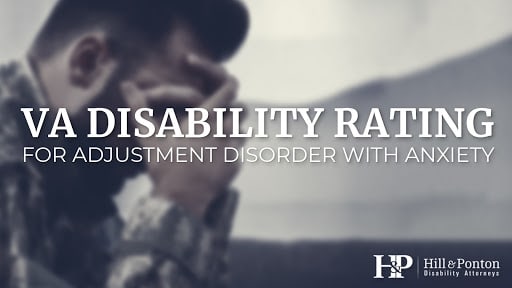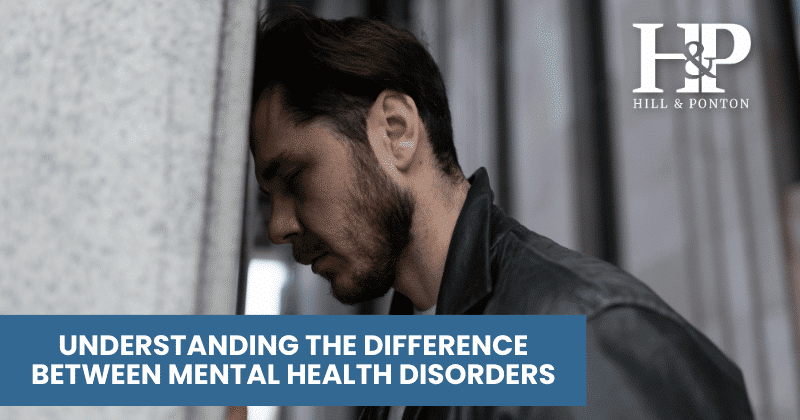Anxiety disorders are among the most common mental health conditions affecting veterans. The stress and trauma experienced during military service can lead to various forms of anxiety, each with its own unique set of symptoms and challenges.
What Types of Anxiety Qualify for VA Disability?
VA recognizes several types of anxiety disorders, if connected to the veteran’s military service, and offers disability benefits to those who are affected.
Generalized Anxiety Disorder (GAD)
Generalized Anxiety Disorder (GAD) is characterized by persistent and excessive worry about a wide range of topics, including health, work, social interactions, and daily responsibilities. Veterans with GAD may find it difficult to control their anxiety, which can interfere with daily life. Common symptoms include:
- Restlessness or feeling on edge
- Fatigue or being easily tired
- Difficulty concentrating or mind going blank
- Irritability
- Muscle tension
- Sleep disturbances, such as difficulty falling or staying asleep
GAD can significantly impact a veteran’s ability to function at work and maintain relationships, leading to social and occupational impairment. See the VA ratings for generalized anxiety disorder.
Panic Disorder
Panic Disorder involves sudden, intense episodes of fear or discomfort, known as panic attacks. These attacks can occur unexpectedly and often involve both physical and emotional symptoms that can be overwhelming. Find out more about VA disability for panic disorder.
Social Anxiety Disorder (Social Phobia)
Social Anxiety Disorder, also known as Social Phobia, is characterized by intense fear and avoidance of social situations where the veteran may be exposed to possible scrutiny by others. This fear often stems from worries about being judged, embarrassed, or humiliated.
Symptoms of Social Anxiety Disorder may include:
- Fear of social interactions or performing in front of others
- Avoidance of social situations, leading to isolation
- Intense anxiety or panic attacks in social settings
- Difficulty making eye contact or speaking in front of others
- Physical symptoms such as blushing, sweating, trembling, or a rapid heartbeat
Social Anxiety Disorder can severely limit a veteran’s ability to work, maintain relationships, and engage in daily activities. See VA ratings.
Post-Traumatic Stress Disorder (PTSD)
Post-Traumatic Stress Disorder (PTSD) is a severe anxiety disorder that develops after exposure to a traumatic event, such as combat, physical assault, or a life-threatening situation. While PTSD is often considered separately, it is closely related to other anxiety disorders. Learn more about PTSD in our comprehensive guide here.
Obsessive-Compulsive Disorder (OCD)
Obsessive-Compulsive Disorder (OCD) involves unwanted, persistent thoughts (obsessions) that cause anxiety, often leading to repetitive behaviors (compulsions) performed to alleviate this anxiety. OCD can be debilitating, as obsessions and compulsions often take up significant time and interfere with daily activities and responsibilities.
Specific Phobias
Specific Phobias are characterized by an intense, irrational fear of a specific object or situation, such as flying, heights, or confined spaces. Unlike other anxiety disorders, the fear in specific phobias is focused on one thing, and exposure to that object or situation triggers a panic-like reaction. Symptoms may include:
- Immediate anxiety response when faced with the feared object or situation
- Avoidance of the feared object or situation
- Physical symptoms such as sweating, trembling, rapid heartbeat, or difficulty breathing
Specific Phobias can severely limit a veteran’s ability to engage in certain activities, travel, or even leave the house, depending on the nature of the phobia.
What is the VA Rating for Anxiety Disorder?
An anxiety disorder VA rating can range from 0% to 100%, depending on the severity of the symptoms and their impact on your daily life and ability to work.
VA uses the General Rating Formula for Mental Disorders under 38 CFR § 4.130 to determine the disability ratings for anxiety, which considers various factors, including the frequency, duration, and intensity of symptoms.
- 0%: A mental condition has been formally diagnosed, but symptoms are not severe enough either to interfere with occupational and social functioning or to require continuous medication.
- 10%: Occupational and social impairment due to mild or transient symptoms which decrease work efficiency and ability to perform occupational tasks only during periods of significant stress, or symptoms controlled by continuous medication.
- 30%: Occupational and social impairment with occasional decrease in work efficiency and intermittent periods of inability to perform occupational tasks (although generally functioning satisfactorily, with routine behavior, self-care, and conversation normal), due to such symptoms as: depressed mood, anxiety, suspiciousness, panic attacks (weekly or less often), chronic sleep impairment, mild memory loss (such as forgetting names, directions, recent events).
- 50%: Occupational and social impairment with reduced reliability and productivity due to such symptoms as: flattened affect; circumstantial, circumlocutory, or stereotyped speech; panic attacks more than once a week; difficulty in understanding complex commands; impairment of short- and long-term memory (e.g., retention of only highly learned material, forgetting to complete tasks); impaired judgment; impaired abstract thinking; disturbances of motivation and mood; difficulty in establishing and maintaining effective work and social relationships.
- 70%: Occupational and social impairment, with deficiencies in most areas, such as work, school, family relations, judgment, thinking, or mood, due to such symptoms as: suicidal ideation; obsessional rituals which interfere with routine activities; speech intermittently illogical, obscure, or irrelevant; near-continuous panic or depression affecting the ability to function independently, appropriately and effectively; impaired impulse control (such as unprovoked irritability with periods of violence); spatial disorientation; neglect of personal appearance and hygiene; difficulty in adapting to stressful circumstances (including work or a work-like setting); inability to establish and maintain effective relationships.
- 100%: Total occupational and social impairment, due to such symptoms as: gross impairment in thought processes or communication; persistent delusions or hallucinations; grossly inappropriate behavior; persistent danger of hurting self or others; intermittent inability to perform activities of daily living (including maintenance of minimal personal hygiene); disorientation to time or place; memory loss for names of close relatives, own occupation, or own name.
VA Claims Denied?
Your Fight is Our Mission
How Do I Prove My Anxiety Is a VA Disability?
To qualify for VA disability benefits for anxiety, you must establish that your anxiety disorder is service-connected. This means proving that your anxiety was either caused or aggravated by your military service.
Steps to Establish Service Connection for Anxiety
- Diagnosis: You must have a current diagnosis of an anxiety disorder from a qualified healthcare provider.
- In-Service Event: There must be evidence of an event, injury, or illness during your military service that could have caused or contributed to your anxiety.
- Nexus: A medical nexus opinion linking your current anxiety disorder to the in-service event, injury, or illness is required.
Examples of Nexus Evidence: This could include statements from a psychiatrist or psychologist explaining how the stress or trauma experienced during service likely led to the development of the anxiety disorder, or how your anxiety manifested during your active duty service. Additionally, service records showing treatment for anxiety symptoms while in service can be valuable in establishing a direct connection.
What Evidence Do I Need to Prove an Anxiety VA Disability Claim?
- Medical Records: Include both in-service and post-service medical records documenting your anxiety symptoms and treatment.
- Nexus Letters: Obtain a nexus letter from a qualified medical professional linking your anxiety to your military service.
- Personal Statements: Write a detailed personal statement about how your anxiety affects your daily life and ability to work.
- Buddy Statements: Gather statements from friends, family, or fellow service members who can attest to the severity of your symptoms.
The C&P Exam for Anxiety
One of the most important things in determining your disability rating is the Compensation & Pension (C&P) exam – and its associated form, the Disability Benefits Questionnaire (DBQ).
What Happens During the C&P Exam?
The Compensation & Pension (C&P) exam is a medical examination conducted by a VA healthcare provider or a VA-contracted physician. The purpose of this exam is to assess the severity of your anxiety symptoms and how they affect your daily life, work, and social functioning.
The examiner will review your medical records, ask you about your symptoms, and may conduct a mental health evaluation. Key areas typically covered during a C&P exam for anxiety include:
- Frequency and severity of symptoms: How often you experience anxiety, panic attacks, or other related symptoms.
- Impact on daily activities: How your anxiety affects your ability to work, maintain relationships, and perform daily tasks.
- Treatment and medication: Any ongoing treatments or medications you are using to manage your anxiety and their effectiveness.
The results of the C&P exam are used to determine your VA disability rating. It is crucial to be honest and thorough during the exam, as the examiner’s findings will significantly impact your final rating.
What Is the Role of the DBQ in Rating Your Anxiety?
A Disability Benefits Questionnaire (DBQ) is a form used by VA to gather specific information about your condition from your healthcare provider. The DBQ for anxiety is designed to standardize the collection of medical evidence and includes detailed questions about your anxiety symptoms, their frequency, and their impact on your life.
The DBQ can be completed by your treating physician, psychiatrist, or psychologist and submitted as part of your VA claim. Some important aspects of the DBQ include:
- Symptomatology: The DBQ allows your healthcare provider to document specific anxiety-related symptoms, such as panic attacks, sleep disturbances, and difficulty concentrating.
- Functional Impact: The form includes sections for your provider to describe how your anxiety affects your occupational and social functioning.
- Severity Assessment: Your provider will be asked to assess the severity of your anxiety, including whether your symptoms are mild, moderate, or severe.
Winning Anxiety Disability Cases
How to Get 100% VA Disability Rating for Generalized Anxiety Disorder with Depression: Case Example
In this case, a veteran who served in the U.S. military from July 1944 to January 1946 filed a claim for an increased disability rating for her service-connected generalized anxiety disorder with depression. Initially, the veteran received a 70% disability rating but believed her symptoms were more severe than reflected in the rating. After appealing the decision, the Board of Veterans’ Appeals reviewed the evidence.
The Board ultimately decided to increase the disability rating to 100% for generalized anxiety disorder with depression. This decision was based on medical evidence showing the veteran’s condition led to total occupational and social impairment, warranting the maximum disability rating under Diagnostic Code 9400.
Key Factors in Winning the Claim:
- Detailed Medical Evidence: The veteran’s case was supported by comprehensive medical records, including a VA examination conducted in December 2006. This examination revealed significant symptoms such as nervousness, depression, decreased energy, isolative behavior, and feelings of hopelessness and worthlessness. The veteran reported that she had no friends, rarely left her room, and was unemployed. The examiner noted that the severity of her symptoms alone would likely render her unemployable, and a Global Assessment of Functioning (GAF) score of 40 was assigned, indicating major impairment in several areas, such as work, family relations, and mood.
- Consistent Symptom Documentation: Throughout the appeal process, the veteran’s medical records consistently documented her symptoms, including depressed mood, flat affect, and anxiety. These records provided a continuous and clear picture of the veteran’s condition and its impact on her daily life.
- Veteran Testimony: During a September 2009 Board hearing, the veteran testified about her severe symptoms and their impact on her ability to function. She described how her anxiety and depression prevented her from performing tasks and led to increased isolation. This testimony added a compelling narrative to the case, reinforcing the medical evidence.
How a Veteran Got 70% VA Disability Rating and TDIU for Unspecified Anxiety Disorder
In this case, a veteran who served in the U.S. Army from April 2009 to November 2014 sought an increased disability rating for his service-connected unspecified anxiety disorder. Initially rated at 30%, the veteran appealed for a higher rating, leading the Board of Veterans’ Appeals to review the evidence.
The Board granted a 70% disability rating for the veteran’s unspecified anxiety disorder, effective throughout the entire period of the claim. Additionally, the Board approved the veteran’s claim for a Total Disability Rating based on Individual Unemployability (TDIU), acknowledging that his service-connected disabilities rendered him unable to obtain or maintain substantially gainful employment.
Key Factors in Winning the Claim:
- Holistic Analysis of Symptoms: The Board conducted a comprehensive review of the veteran’s symptoms and their impact on his life. While the veteran’s anxiety disorder did not manifest in total occupational and social impairment, it did cause significant deficiencies in most areas of his life, including work, family relations, judgment, and mood. Symptoms such as suicidal ideation, near-continuous depression, irritability, and difficulty adapting to stressful circumstances contributed to the decision to assign a 70% rating.
- Consistent Documentation of Impairment: Medical evidence from VA examinations and private medical opinions consistently documented the severity of the veteran’s anxiety disorder. A 2017 examination and subsequent reports highlighted symptoms such as anxiety, chronic sleep impairment, suicidal ideation, and the inability to maintain effective relationships. The veteran’s condition required assistance from family members for daily tasks and demonstrated a significant impact on his ability to function independently.
- Inability to Maintain Gainful Employment: The veteran’s service-connected disabilities, including his anxiety disorder, thoracolumbar spine strain, bilateral pes planus, and radiculopathy, significantly limited his physical and mental capacity to work. The veteran attempted to work as a security guard but struggled due to chronic pain, anxiety, and depression. His inability to maintain steady employment and complete academic programs further demonstrated his total occupational impairment, supporting the TDIU decision.
- Professional Medical Opinions: Opinions from mental health professionals and vocational experts played a crucial role in the appeal. Dr. G. and Dr. B. provided detailed assessments, indicating that the veteran’s anxiety and physical impairments prevented him from sustaining any form of substantially gainful employment. These opinions were instrumental in the Board’s decision to grant TDIU.
This case underscores the importance of thorough documentation of symptoms, consistent medical evidence, and the impact of disabilities on employability when seeking a higher VA disability rating and TDIU. Veterans in similar situations should ensure that their medical records and professional evaluations clearly demonstrate the extent of their impairments and their effect on daily life and work capacity.
Attorney Tips for a Successful Anxiety VA Claim
Here’s some tips from our legal team to help you secure the VA disability benefits you deserve for your anxiety-related claims.
- Document Everything: Keep detailed records of your symptoms, treatment, and any impact on your life.
- Be Honest at Your C&P Exam: The Compensation & Pension (C&P) exam is crucial. Be open about your symptoms, even if it’s uncomfortable.
- Consider Secondary Conditions: Anxiety can lead to other conditions like depression or PTSD. These secondary conditions may also be compensable.
- Seek Legal Assistance: If your claim is denied or you receive a low rating, consider consulting with a VA disability lawyer.




